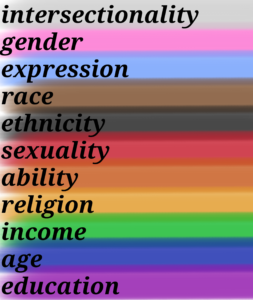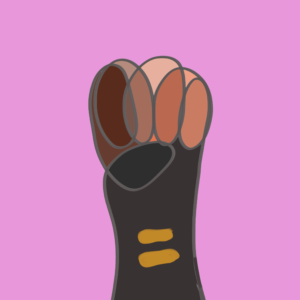
As someone with intersectional identities, there are situations that other people just do not understand. So many things are designed for the majority, like due dates and staircases.
We live in a white heteronormative society that does not do much for “outsiders”.
The struggle with such simple things, both mentally and physically, is very real and impacts me every day, but I have to do my best and fight past that.
There are many minorities worldwide that face unique challenges, especially when these identities intersect. Race, gender, expression and ability can all factor into what makes someone who they are. These things sit on a spectrum, and so do their impact.
I have learned to not expect people who do not have marginalized identities to understand why I stay up all night bouncing between racing thoughts and nightmares about having brutal hate crimes directed at me, so I sleep until noon when that causes my pain to flare up. My bones freeze, my back seizes, my joints fall out of place and I am left trying to catch up on sleep at the most inconvenient of times. It is a unique experience that will only earn confused pity when I explain it. Lots of apologies come my way when I just try to explain my struggle.
While these difficulties present themselves in everyday life, me and others of intersecting identities do not let it stop us.
Lee Hewerdine, a transgender disabled young artist from Texas, has faced situations such as having poems written and read to the class by students making fun of Lee and their identity. Lee has been able to take their struggles and use it to educate younger audiences. Based on their health struggles, they wrote a book titled “My Tube and Me.”
“I just really like teaching people things in a way that isn’t condescending” they said.
There are other young students that face unique challenges due to their intersecting identities.
Benjamen Simons, a gay person from Ohio, was made the homemaker at a young age due to health concerns their mother faced. Although this was a struggle for

a long time, Ben has found a safe, accepting environment.
“I think it made me grow up maybe quicker than I needed,” Ben said.
They would sometimes make minor changes in appearance to avoid being perceived in a negative way, but were generally accepted for their sexuality throughout school. Even after dropping out of high school, they were able to start college before their 18th birthday.
Although the majority will never quite have a true grasp on our struggles and experiences, they can have an understanding of the advantage at hand.
“It pains me to admit this,” Matthew Nelson an MCCC student said. Matthew said he is understanding of others and is aware of his privilege.
It might not be the best, but I know, for me at least, hearing the experiences of others gives me a little hope to get up every morning, even if I need my cane to do it.

